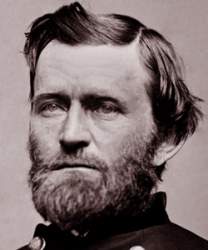Record Data
Source citation
Reprinted in Frank Moore, ed., The Rebellion Record: A Diary of American Events, with Documents, Narratives, Illustrative Incidents, Poetry, Etc. (New York: G.P.Putnam, 1861), III: 278-279.
Type
Military record
Date Certainty
Exact
Transcriber
John Osborne
Transcription date
Transcription
The following text is presented here in complete form, as it originally appeared in print. Spelling and typographical errors have been preserved as in the original.
Cairo, Nov. 12, 1861.
On the evening of the 6th inst. I left this place with two thousand eight hundred and fifty men of all arms, to make a reconnoissance toward Columbus. The object of the expedition was to prevent the enemy from sending out reinforcements to Price's army in Missouri, and also from cutting off columns that I had been directed to send out from this place and Cape Girardeau, in pursuit of Jeff. Thompson. Knowing that Columbus was strongly garrisoned, I asked Gen. Smith, commanding at Paducah, Ky., to make demonstrations in the same direction. He did so by ordering a small force to Mayfield and another in the direction of Columbus, not to approach nearer, however, than twelve or fifteen miles. I also sent a small force on the Kentucky side with orders not to approach nearer than Ellicott's Mills, some twelve miles from Columbus. The expedition under my immediate command was stopped about nine miles below here on the Kentucky shore, and remained until morning. All this served to distract the enemy, aud led him to think he was to be attacked in his strongly fortified position. At daylight we proceeded down the river to a point just out of range of the rebel guns, and debarked on the Missouri shore. From here the troops were marched by flank for about one mile toward Belmont, and then drawn up in line of battle, a battalion also having been left as a reserve near the transports. Two companies from each regiment, five skeletons in number, were then thrown out as skirmishers, to ascertain the position of the enemy. It was but a few moments before we met him, and a general engagement ensued.
The balance of my forces, with the exception of the reserve, was then thrown forward —all as skirmishers— and the enemy driven foot by foot, and from tree to tree, back to their encampment on the river bank, a distance of two miles. Here they had strengthened their position by felling the timber for several hundred yards around their camp, and making a sort of abatis. Our men charged through this, driving the enemy over the bank into their transports in quick time, leaving us in possession of every thing not exceedingly portable. Belmont is on low ground, and every foot of it is commanded by the guns on the opposite shore, and of course could not be held for a single hour after the enemy became aware of the withdrawal of their troops. Having no wagons, I could not move any of the captured property; consequently, I gave orders for its destruction. Their tents, blankets, &c., were set on fire, and we retired, taking their artillery with us, two pieces being drawn by hand; and one other, drawn by an inefficient team, we spiked and left in the woods, bringing the two only to this place. Before getting fairly under way the enemy made his appearance again, and attempted to surround us. Our troops were not in the least discouraged, but charged on the enemy again, and defeated him. Our loss was about eighty-four killed, one hundred and fifty wounded —many of them slightly— and about an equal number missing. Nearly all the missing were from the Iowa regiment, who behaved with great gallantry, and suffered more severely than any other of the troops.
I have not been able to put in the reports from sub-commands, but will forward them as soon as received. All the troops behaved with much gallantry, much of which is attributed to the coolness and presence of mind of the officers, particularly the colonels. Gen. McClernand was in the midst of danger throughout the engagement, and displayed both coolness and judgment, his horse was three times shot. My horse was also shot under me. To my staff, Capts. Rawlins, Logan, and Hillyer, volunteer aids, and to Capts. Hatch and Graham, I am much indebted for the assistance they gave. Col. Webster, acting chief engineer, also accompanied me, and displayed highly soldier-like qualities. Col. Dougherty, of the Twenty-second Illinois Volunteers, was three times wounded and taken prisoner.
Tlie Seventh Iowa regiment had their Lieut.Colonel killed, and the Colonel and Major were severely wounded. The reports to be forwarded will detail more fully the particulars of our loss. Surgeon Brinton was in the field during the entire engagement, and displayed great ability and efficiency in providing for the wounded and organizing the medical corps.
The gunboats Tyler and Lexington, Capts. Walker and Stemblo, U. S. N., commanding, convoyed the expedition and rendered most efficient service. Immediately upon our landing they engaged the enemy's batteries, and protected our transports throughout.
For particulars see accompanying report of Capt. Walker.
I am, sir, very respectfully, your obedient servant,
U.S.Grant,
Brig.-Gen. Commanding.






